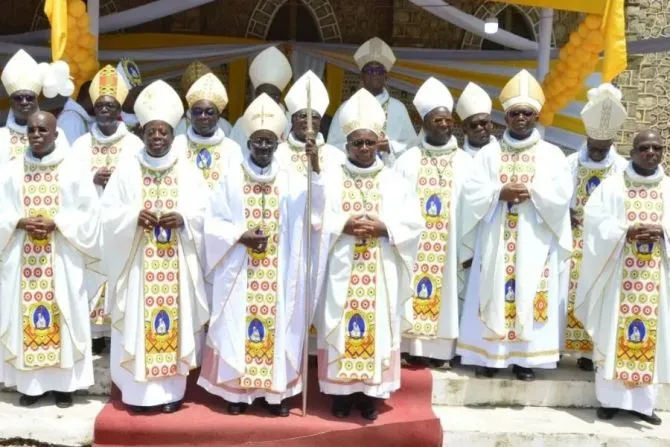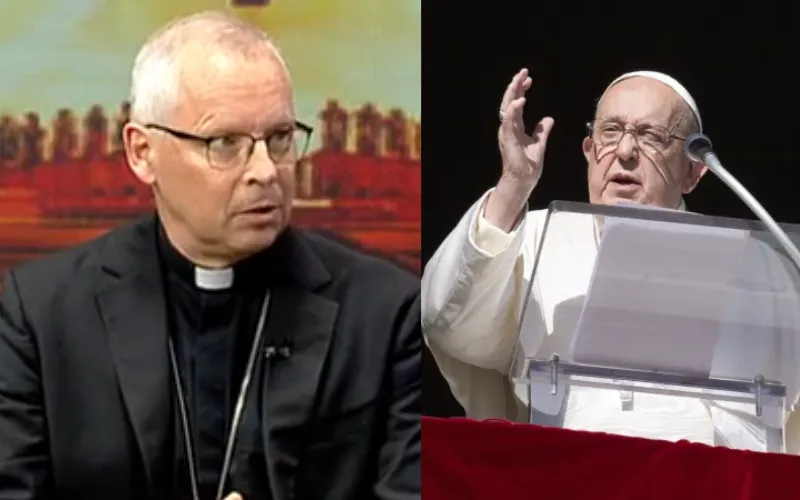Another Kenyan bishop, Bishop Cleophas Oseso Tuka of the Diocese of Nakuru, said in a New Year’s message that “the blessings of the same-sex union fundamentally goes against what the Church teaches,” according to the Kenya-based Nation Media group.
Bishop Martin Mtumbuka of Karonga Diocese issued a strong condemnation of the document, alleging both heresy and blasphemy.
“[It] looks to us like a heresy; it reads like a heresy; and its effects a heresy,” the bishop said.
“We cannot allow such an offensive and apparently blasphemous declaration to be implemented in our dioceses,” Mtumbuka said and apologized to Catholics who have been “deeply hurt and scandalized by this declaration.”
The Symposium of Episcopal Conferences of Africa and Madagascar, which represents all of the bishops on the continent, has sent a letter to the bishops asking for their input on Fiducia Supplicans. The ecclesiastical body plans to “draw up a single synodal pronouncement, valid for the whole Church in Africa.”
(Story continues below)
Bishops elsewhere remain divided on the declaration
Church hierarchy around the world has continued to issue guidance on Fiducia Supplicans, but not all bishops are on the same page. Some bishops have welcomed the declaration, some are approaching it with caution, and others are refusing to implement it.
The Hungarian Catholic Bishops Conference joined the bishops of several other Eastern and Central European countries in rejecting any blessings for same-sex couples: “We can bless all people individually, regardless of their gender identity and sexual orientation, but we must always avoid that for couples.”
Bishop János Székely of the Diocese of Szombathely reaffirmed that stance within his diocese, saying that such blessings would provide “the moral approval of the Church for their relationship and their life decision.”
“We would be falsifying the Gospel of Christ and failing to do what we should do as pastors toward such a couple if we were to give a blessing to the two of them in such a case,” the bishop added.
Bishop Adair José Guimarães of the Diocese of Formosa, Brazil, announced that he would not implement the declaration in his diocese after consulting lay Catholics and priests. He said the priests who responded “were practically unanimous that these applications would bring misunderstanding and scandal” and concluded that “our diocese is not in a position to apply these suggestions.”
Bishop Rafael Escudero López-Brea of the Territorial Prelature of Moyobamba in Peru ordered priests “not to carry out any form of blessing for couples in an irregular situation or for same-sex couples.”
The Polish Episcopal Conference similarly rejected any same-sex blessings within Poland, and the Ukrainian Greek Catholic Church stated that the declaration does not apply to Eastern Catholic churches.
Bishop Marc Aillet of the Diocese of Bayonne, France, raised concerns about blessing the “couple,” as permitted in the declaration, rather than simply blessing “two individual people,” warning that it seems to “endorse the homosexual activity which links them.”
For this reason, the bishop will permit his priests to bless persons individually, rather than bless the couple: “I invite them, if people ask, to give them a blessing, provided that it is to each person individually, calling them to conversion and inviting them to ask for the help of the grace that the Lord grants to all those who ask him to conform their lives to the will of God.”
This approach is different from Archbishop Hervé Giraud of the Archdiocese of Sens and Auxerre in France, who embraced the blessings of same-sex couples and indicated that he may perform some himself: “I believe it’s based on a beautiful idea of blessing, according to the Gospel and the style of Christ.”
Bishop José Antonio Satué of the Diocese of Teruel and Albarracín in Spain clarified that blessings for same-sex couples also embraced the declaration. “The declaration of the Holy See helps us appreciate the attitude of those who approach the Church requesting a blessing,” the bishop said.
Archbishop Mate Uzinić of the Archdiocese of Rijeka in Croatia is another European bishop who praised the declaration. “The statement is a call not to throw stones but to be close to those who seek God’s closeness,” he said.
The heads of the bishops’ conferences in both Austria and Germany also strongly embraced the blessings of same-sex couples.
Similarly, the document received support from the Diocese of Hong Kong: “The pastoral blessings to those who yearn for God’s mercy and long to entrust their lives into his hands are meant to help them to live fully [according] to his will and to lead them to salvation. This has always been the way that God leads mankind to salvation.”
In the pope’s native country of Argentina, Episcopal Conference President Bishop Oscar Ojea also spoke positively of the declaration, saying it “does not give rise to confusion” and that confusing the blessing with approval or permission “would be reductionism.”
“Living in an irregular situation or carrying out a homosexual union does not obscure many aspects of the lives of people who seek to be enlightened with a blessing and upon receiving it, this becomes the greatest possible good for these brothers since it leads to conversion,” the bishop said.
More American bishops have also noted that the blessings should not be confused with approval of homosexual activities.
“That doesn’t mean we approve,” Cardinal Timothy Dolan of the Archdiocese of New York said in a Christmas message on Fox 5 New York.
“That doesn’t mean that a part of the blessing isn’t a call to conversion of heart and to live our lives in conformity to the revelation of God,” the cardinal said. “But it’s a good thing to remind us that we’re all in God’s embrace.”








